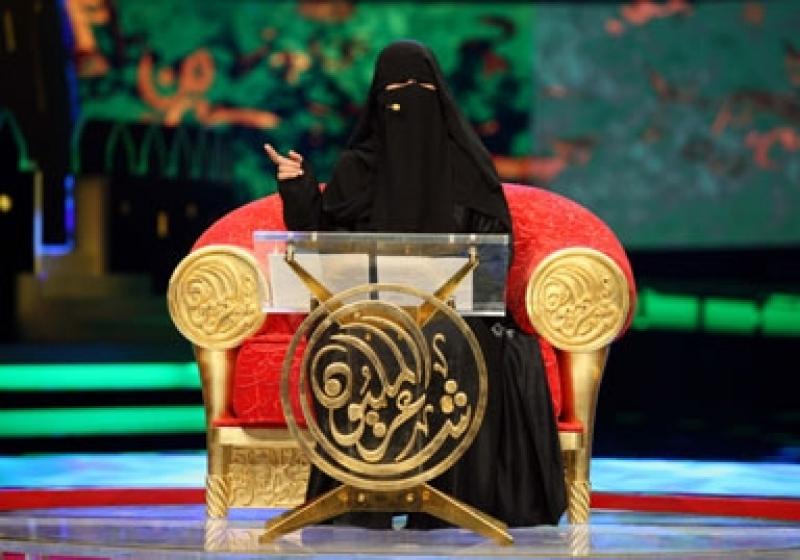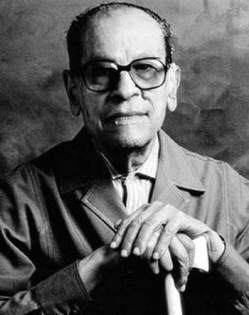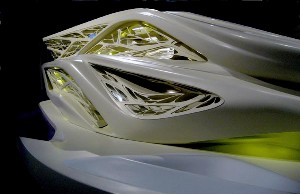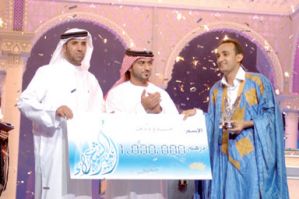theartsdesk in Abu Dhabi: Doing Things by the Book | reviews, news & interviews
theartsdesk in Abu Dhabi: Doing Things by the Book
theartsdesk in Abu Dhabi: Doing Things by the Book
A boom in Arab literacy is much needed - cue prizes and poetry talent shows

One of the most serious crises facing the Arabic-speaking world in recent years - but which has received precious little comment both in the Middle East and internationally - has been the serious decline in literacy and the art of reading. A United Nations report published in 2008 showed that the average Arab reads a mere four pages of literature a year. Compare that to Americans, who devour a median 11 books annually, and the British who clock in at eight.
In an area which boasts many of the richest countries on earth, basic literacy is a mere 75 per cent (compared to Europe’s 99 per cent) among its 200 million inhabitants over the age of 15. All of which is a far cry from the Muslim world’s traditional and idealised self-image as being “People of the Book” – a phrase which refers specifically to the Koran, but which is generally understood to include all literature and learning. In recent years, the various Ministries of Culture in the Middle East have tried all kinds of stunts to ramp up reading amongst their citizens, but a combination of chaotic and patchy distribution, serious problems of piracy and copyright, state and religious censorship and the lack of a unified indexing system has not helped at all.
For each title published, an average of only 3,000 is printed, and if one takes Lebanon and Egypt (the two main centres of publishing in the Arab world) out of the equation, that figure descends dramatically. An old Arab dictum has it that “Cairo writes, Beirut publishes, and Baghdad reads”. Not surprisingly, the Egyptian novelist Naguib Mahfouz (pictured below right) is still the region’s only Nobel Prizewinner for Literature.
 One of Egypt’s most important publishers is the American University of Cairo Press (AUC), with about 100 titles a year, of which no more than 15 are fiction. At the time of his Nobel award in 1988, Mahfouz was published by the AUC alone. Egypt is also home to the Arab-speaking world’s only other two novelists of international note: Alaa al Aswany, whose The Yacoubian Building is the Arab world’s best-selling novel of all time, and Ahdaf Soueif, shortlisted for the Booker Prize in 1999 for her pioneering opus The Map of Love.
One of Egypt’s most important publishers is the American University of Cairo Press (AUC), with about 100 titles a year, of which no more than 15 are fiction. At the time of his Nobel award in 1988, Mahfouz was published by the AUC alone. Egypt is also home to the Arab-speaking world’s only other two novelists of international note: Alaa al Aswany, whose The Yacoubian Building is the Arab world’s best-selling novel of all time, and Ahdaf Soueif, shortlisted for the Booker Prize in 1999 for her pioneering opus The Map of Love.
Last year, meanwhile, Lebanon promoted its reputation as a centre of publishing when it was declared World Capital of Books 2009. Help came from the people behind the Hay Festival and their Lebanese interlocutors – known as the Beirut39 group. As the name implies, Beirut39 is composed of 39 writers aged 39 and under, including Hamdy el Gazzar, widely seen as the hottest new name in the region. His widely acclaimed first novel, Black Magic, won the Egyptian Sawiris Foundation for Literature prize in 2006, and he is now seen as the key figure of the Cairo literary scene.
And yet it is neither Beirut nor Cairo that seems likely to emerge as the Middle East’s first global capital of literature and publishing, but Abu Dhabi, the largest of the seven Emirates that make up the United Arab Emirates (UAE) in the Persian Gulf, snuggling up to Iran across the Straits. While their nearby, noisier neighbours in Dubai have spent the last 20 years or so trying to create a 21st-century Islamic Manhattan, the more reflective rulers of Abu Dhabi have been quietly investing in cultural heritage and the arts in order to make their mark on the world.
 While many are now familiar with designs for the ambitious new museums complex currently being built in the reclaimed Saadiyat Island (designed by the likes of Jean Nouvel, Frank Gehry, Zaha Hadid, Norman Foster and Japanese wunderkind Tadao Ando), they may be less aware of Abu Dhabi’s emergence as a serious centre for literature and publishing. (Pictured left, the design for Hadid's Performing Arts building.)
While many are now familiar with designs for the ambitious new museums complex currently being built in the reclaimed Saadiyat Island (designed by the likes of Jean Nouvel, Frank Gehry, Zaha Hadid, Norman Foster and Japanese wunderkind Tadao Ando), they may be less aware of Abu Dhabi’s emergence as a serious centre for literature and publishing. (Pictured left, the design for Hadid's Performing Arts building.)
Thanks to the relatively enlightened attitudes of the Emirate’s ruling dynasty, the Al Nahyans, and the tireless work of Zaki Al Nusseibah – a formidable intellectual figure who has transcended his families’ Palestinian aristocratic roots to become as important to the Al Nahyan Sheikhs as Malraux was to De Gaulle - Abu Dhabi has positioned itself formidably as a hub of the arts. The Abu Dhabi Festival, which began on 20 March and runs until 7 April, boasts an outstanding programme of both Middle Eastern and International performers (the LSO under Sir Colin Davis, Wynton Marsalis and Leif Ove Andsnes), not to mention world-class venues and facilities.
This comes hard on the heels of the Abu Dhabi International Book Fair (ADIBF), founded in 2004, which brings together most of the top Arab writers and poets, as well as attracting some major international names: Ian McEwan, and Kolkata’s presiding muse Amrit Chaudhuri. Organised and sponsored by the Emirate’s influential Abu Dhabi Authority for Culture & Heritage (ADACH), through its literary arm Kitab (Arabic for "book") in coordination with the Frankfurt Book Fair, the book fair is specifically aiming at overcoming the problems related to distribution, copyright, translation – and of course, discreetly, issues around censorship.
ADACH’s massive resources insured the presence at the 2009 edition of some 637 publishing houses from 52 different nations and, perhaps more importantly, over 200,00 visitors, in a country just shy of 1.5 million inhabitants (of which only 20 per cent are native Emiratis). One of Kitab’s biggest tools for attracting publishing deals is the Spotlight on Rights scheme, which offers a $1000 subsidy to any non-Arabic publisher who secures rights on an Arabic title, or any Arabic one who translates a non-Arabic text into the language of the Koran.
The ADIBF also boasts the premium Sheikh Zayed book award, which this year went to Algerian critic Hafnaoui Baali for his Comparative Cultural Criticism: An Introduction, and the annual International Prize for Arabic Fiction. Not to be outdone, over in Dubai last week, Martin Amis, Alexander McCall Smith, Kate Mosse, William Dalrymple, Marjane Satrapi and Wilbur Smith were appearing at the second edition of the Emirates Airline Festival of Literature (EAFL). It might admittedly appear to offer a Westernised menu, but if the Gulf states have yet to produce a serious novelist of note, they are certainly not wanting for ranking poets.
The Nabati school of poetry is now the UAE’s principal home-grown contribution to Arab culture, and its composition and recitation amongst the ruling classes is as common as that of haikus in the traditional Japanese imperial household. Both the late ruler of Abu Dhabi, Sheikh Zayed bin Sultan al Nahyan, as well as Sheikh Mohammed bin Rashid Al Maktoum, ruler of Dubai, were avid Nabati poets, as are many of their respective subjects today.
Such is the growth of popular interest in Nabati poetry that last year ABACH launched the Abu Dhabi Poetry Academy to all comers, of all levels of stylistic and literary proficiency, for them to improve their compositional and recitative skills - a first in the Arab world. In collaboration with the National Library, the Poetry Academy also published an annual Poetry Encyclopedia, now in its fourth edition and currently made up of some 2,700 collections of poetry, a total of nearly 140,000 poems.
The extraordinary appetite for poetry amongst the Emiratis led to Kitab, the organisers of the Abu Dhabi Book Festival, to install a "Textbox" - a soundproof booth designed to host poets whose words are transmitted via headphones then simultaneously translated into Arabic on a screen - as well as to sponsor numerous events of American-influenced "slam poetry". One of these events featured slam poets Bas Boettcher and Timotheus who, after performing, explained the details of their technique to their delighted audience, for whom improvisation on a theme is part of the local Nabati vernacular tradition.
 Mindful of this popular enthusiasm, the Abu Dhabi cultural authorities also organise an annual televised Classical Arabic Poetry competition, The Prince of Poets, to encourage a new generation between 18 and 45 to hone their talents in both rhymed or blank verse, enabling them to meet established poets, and teaching them to identify the rhythms and rhymes of various schools of poetry. Each contestant must send in a poem between 20 and 30 verses. First prize for the competition is worth one million UAE dirhams (about £180,000) in addition to the prestigious title "Prince of Poets". Last year’s title was awarded to a Mauritanian poet, Mohamed Ould Bemba (pictured above right).
Mindful of this popular enthusiasm, the Abu Dhabi cultural authorities also organise an annual televised Classical Arabic Poetry competition, The Prince of Poets, to encourage a new generation between 18 and 45 to hone their talents in both rhymed or blank verse, enabling them to meet established poets, and teaching them to identify the rhythms and rhymes of various schools of poetry. Each contestant must send in a poem between 20 and 30 verses. First prize for the competition is worth one million UAE dirhams (about £180,000) in addition to the prestigious title "Prince of Poets". Last year’s title was awarded to a Mauritanian poet, Mohamed Ould Bemba (pictured above right).
Attracting even larger audiences is Abu Dhabi television’s Million’s Poet [sic] which follows a format based on those familiar from British talent contests, attracting vast audiences around the Arab world. The 48 contestants, selected by a panel of Nabati experts from a vast number of initial applicants from all over the Middle East, have been battling it out on Abu Dhabi’s screens for the last few weeks, with the final knockout edition scheduled for a couple of week’s time. Contestants have to compose poems on a number of set themes, following some quite complex stylistic rules, improvising their poem in response to a famous set poem, with careful regard for density of language, rhyme and subject, but without using the set poet’s name, or re-using any of his metaphors.
Leading the pack of semi-finalists is controversial young Saudi poetess Hissa Hilal (main picture above), who last week stunned the judges and viewers alike with her hard-hitting 15-line free verse composition criticising the fatwas issued against her by some rather uptight religious authorities: she was awarded 47 points out of 50.
Last year’s winner, and still reigning champion, Ziyad Bin Hjab Bin Naheeb, will have the opportunity to defend the title by competing with the five finalists. According to indiscretions from the panel of judges, at next week’s heat delivered live from the stage at the Al Raha Beach on the Corniche in Abu Dhabi, Hissa Hilal will deliver a poem critiquing the role of the Arab media, while her rival semi-finalists will variously riff on the role of the armed forces, the topic of women's rights, and terrorism and extremism. What on earth would Simon Cowell say?
Explore topics
Share this article
Add comment
The future of Arts Journalism
You can stop theartsdesk.com closing!
We urgently need financing to survive. Our fundraising drive has thus far raised £49,000 but we need to reach £100,000 or we will be forced to close. Please contribute here: https://gofund.me/c3f6033d
And if you can forward this information to anyone who might assist, we’d be grateful.

Subscribe to theartsdesk.com
Thank you for continuing to read our work on theartsdesk.com. For unlimited access to every article in its entirety, including our archive of more than 15,000 pieces, we're asking for £5 per month or £40 per year. We feel it's a very good deal, and hope you do too.
To take a subscription now simply click here.
And if you're looking for that extra gift for a friend or family member, why not treat them to a theartsdesk.com gift subscription?
more
 'We are bowled over!' Thank you for your messages of love and support
Much-appreciated words of commendation from readers and the cultural community
'We are bowled over!' Thank you for your messages of love and support
Much-appreciated words of commendation from readers and the cultural community
 The Diplomat, Season 3, Netflix review - Ambassador Kate Wyler becomes America's Second Lady
Soapy transatlantic political drama keeps the Special Relationship alive
The Diplomat, Season 3, Netflix review - Ambassador Kate Wyler becomes America's Second Lady
Soapy transatlantic political drama keeps the Special Relationship alive
![SEX MONEY RACE RELIGION [2016] by Gilbert and George. Installation shot of Gilbert & George 21ST CENTURY PICTURES Hayward Gallery](https://theartsdesk.com/sites/default/files/styles/thumbnail/public/mastimages/Gilbert%20%26%20George_%2021ST%20CENTURY%20PICTURES.%20SEX%20MONEY%20RACE%20RELIGION%20%5B2016%5D.%20Photo_%20Mark%20Blower.%20Courtesy%20of%20the%20Gilbert%20%26%20George%20and%20the%20Hayward%20Gallery._0.jpg?itok=7tVsLyR-) Gilbert & George, 21st Century Pictures, Hayward Gallery review - brash, bright and not so beautiful
The couple's coloured photomontages shout louder than ever, causing sensory overload
Gilbert & George, 21st Century Pictures, Hayward Gallery review - brash, bright and not so beautiful
The couple's coloured photomontages shout louder than ever, causing sensory overload
 From Historical to Hip-Hop, Classically Black Music Festival, Kings Place review - a cluster of impressive stars for the future
From quasi-Mozartian elegance to the gritty humour of a kitchen inspection
From Historical to Hip-Hop, Classically Black Music Festival, Kings Place review - a cluster of impressive stars for the future
From quasi-Mozartian elegance to the gritty humour of a kitchen inspection
 The Perfect Neighbor, Netflix review - Florida found-footage documentary is a harrowing watch
Sundance winner chronicles a death that should have been prevented
The Perfect Neighbor, Netflix review - Florida found-footage documentary is a harrowing watch
Sundance winner chronicles a death that should have been prevented
 Bryony Kimmings, Soho Theatre Walthamstow review - captivating tale of the cycle of life
Witty ode to Mother Nature
Bryony Kimmings, Soho Theatre Walthamstow review - captivating tale of the cycle of life
Witty ode to Mother Nature
 Blu-ray: Le Quai des Brumes
Love twinkles in the gloom of Marcel Carné’s fogbound French poetic realist classic
Blu-ray: Le Quai des Brumes
Love twinkles in the gloom of Marcel Carné’s fogbound French poetic realist classic
 La bohème, Opera North review - still young at 32
Love and separation, ecstasy and heartbreak, in masterfully updated Puccini
La bohème, Opera North review - still young at 32
Love and separation, ecstasy and heartbreak, in masterfully updated Puccini
 Frankenstein review - the Prometheus of the charnel house
Guillermo del Toro is fitfully inspired, but often lost in long-held ambitions
Frankenstein review - the Prometheus of the charnel house
Guillermo del Toro is fitfully inspired, but often lost in long-held ambitions
 Shibe, LSO, Adès, Barbican review - gaudy and glorious new music alongside serene Sibelius
Adès’s passion makes persuasive case for the music he loves, both new and old
Shibe, LSO, Adès, Barbican review - gaudy and glorious new music alongside serene Sibelius
Adès’s passion makes persuasive case for the music he loves, both new and old
 Solar Eyes, Hare & Hounds, Birmingham review - local lads lay down some new tunes for a home crowd
Psychedelic indie dance music marinated in swirling dry ice
Solar Eyes, Hare & Hounds, Birmingham review - local lads lay down some new tunes for a home crowd
Psychedelic indie dance music marinated in swirling dry ice
 The Free Association launch review - strong start for improv company
Troupe moves into permanent home
The Free Association launch review - strong start for improv company
Troupe moves into permanent home

Comments
...
...
...